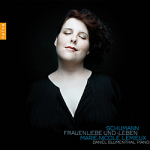Marie-Nicole Lemieux sings Schumann: two song cycles
Frauenliebe und -leben and Liederkreis - new recording from naïve

“What a luscious and luminous recital! Alto Marie-Nicole Lemieux’s voice is lush and lovely with effortless skill combined with a full-bodied tone … .Pianist Daniel Blumenthal is at once a support and a guide for Lemieux’s ardent interpretations and the result is immensely compelling.” – All Music Guide review of Lemieux’s all-French recital album, L’heure exquise
The acclaimed Canadian contralto Marie-Nicole Lemieux sings two major song cycles by Robert Schumann (1810-56), and four other songs by the composer (“Der Nussbaum”, “Er ist’s”, “Loreley”, and “Widmung”), on a new recording from naïve. Pianist Daniel Blumenthal accompanies Lemieux in the Liederkreis (Op. 39) and Frauenliebe und -leben (Op. 42), both written in 1840 when Schumann, who had long avoided the song genre, suddenly threw himself into writing Lieder with a surpassing passion – 138 songs in 1840 alone! “I can do nothing else; I’d like to sing myself to death, like a nightingale,” he declared to his beloved Clara at the time.
The twelve songs of Liederkreis are settings of poems by Joseph von Eichendorff, and Schumann described this “circle of songs” as the most romantic of his works. Claire Badiou explains in the liner notes that “the composer found in the poetry of his contemporary the whole thematic repertory of Romanticism. Schumann’s cycle presents no intelligible narrative framework, no linear evolution or plot; it derives its unity, rather, from an atmosphere, a special ‘Stimmung’, which envelops each of the episodes.”
Badiou goes on to observe, “The organization of Frauenliebe und -leben is noticeably different, in that the work’s cyclic character was already imposed on it by the poetic text [by Chamisso] ... The verse reflects the aesthetic of the Biedermeier period in evoking the successive stages in a woman’s life: burgeoning first love, amorous ecstasy, engagement, marriage, motherhood, and conjugal fidelity that continues after the husband’s death.”
In 2000, at the age of 24, contralto Marie-Nicole Lemieux became the first Canadian to win First Prize as well as the Special Prize for Lieder at the Queen Elisabeth Intern ational Music Competition of Belgium. Winning this prestigious award opened the door to an immediate international career, allowing her to perform in recital and with many great orchestras around the world. She has appeared on numerous naïve recordings, including, most recently, Vivaldi’s La fida ninfa, the latest opera release in the label’s landmark Vivaldi Edition. L’heure exquise, her recital of French songs by Hahn, Chausson, and Debussy, received the highest rating from ClassicsToday.com – 10/10 for Artistic Quality/Sound Quality:
“Times are great for fans of mezzos and contraltos, especially ones who perform song recitals as well as opera and oratorio roles. And among today’s several young stars, Quebec-born Marie-Nicole Lemieux has the versatility, technique, artistic instincts, and, of course, the voice to ensure a long and illustrious career … . This is a first-rate recital by a truly extraordinary singer. Accompanist Daniel Blumenthal is a perfect partner, as you never notice a note or dynamic or aspect of phrasing out of sync with Lemieux. Solo singing rarely if ever gets better than this, and the quality of the recording matches the high standard of the performances.”
Lemieux also sang sacred vocal music by Vivaldi in a release last season with Ensemble Matheus under the direction of Jean-Christophe Spinosi. The New York Times observed, “In the more austere Stabat Mater, Marie-Nicole Lemieux sings with a gripping sense of drama, her darkly rich, agile contralto illuminating the text with anguish and passion.”

Comments